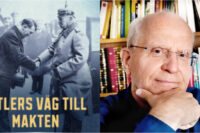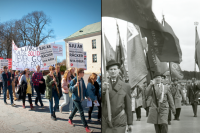
September 11th is my generation’s Kennedy assassination— everyone knows where they were, whom they were with, and what they were doing when they heard the news. Ten years on, Americans reflect on September 11th as a chaotic, surreal day of great tragedy and suffering that stirred a passionate sense of patriotism and national unity.
My fear is that progressive Europeans, particularly a generation younger than mine, remember September 11th not as a solemn day of quiet reflection, but as the event that turned George Bush, and—by implication—the United States, into the devil.
In other words, Americans remember the day, but do Europeans only remember its aftermath?
That might be somewhat of an exaggeration—I have read about several 9/11 memorial services schedule in Europe next week—but having spent a fair amount of time in the last ten years travelling from Sevilla to Stockholm, I’ve sensed a lingering suspicion on your side of the Atlantic: What are America’s real motives? Do the Americans want oil? Money? Colonies? We just don’t know.
While today’s prime ministers and presidents maintain productive working relationships, I’m most concerned about the next generation of European officials. Today’s leaders are products of the Cold War, when America served as the ultimate insurance policy against the Soviet Union. But having come of age in the George Bush generation, it’s not surprising that today’s young leaders might look at the headlines of the last ten years and conclude that America’s nature is to do some pretty strange things.
To be sure, Bush’s policies were not just bad, but embarrassingly so. While he launched a justified attack on Afghanistan in self-defense, he forgot to pay attention to winning the peace. Operation Enduring Freedom has dragged on ten years and could have been completed long ago had Bush not been distracted by Iraq in 2003.
George Bush may have rid the world of Saddam Hussein, but the invasion was launched under false pretenses and has come at too high a price: almost 5,000 American and countless Iraqi lives, nearly $1 trillion, and significant damage to America’s international reputation and alliances.
Bush’s domestic agenda was arguably worse: A massive tax cut that has contributed trillions of dollars to the budget deficit; an education law that many in his own party have since abandoned; and a $400 billion prescription drug program that was useful to those who need cheaper medicine, but not paid for with tax hikes or spending cuts.
Looking back, Bush’s 2004 re-election seems incredible: Most Europeans I know are amazed that Americans would vote for such an incompetent ideologue… twice! But remember that in 2004, Iraq wasn’t going that badly, Afghanistan seemed under control (if anyone was paying attention at all), and the economy had weathered the post-9/11 slow-down.
It’s easy to forget that 2005’s Hurrican Katrina, not Iraq, was the country’s wake-up call. It wasn’t until George Bush’s administration failed to mount an effective relief operation in New Orleans—costing thousands of lives as a major American city drowned—that the country took a step back and said, “Whoa, maybe this guy actually is pretty bad at his job.” Just look at the poll numbers: Bush’s approval number start sliding into the abyss in September 2005.
This all matters for two very important reasons.
First, America is much better than George Bush. Yes, the United States makes mistakes, and will make more. Yet my country has an amazing capacity to correct its faults—there is no greater example than the anti-Bush who currently resides in the White House. Further, over the arc of its history, America’s sacrifices to advance a safer, more prosperous and freer world far outweigh those mistakes. If you’ve only grown up under George Bush, go back and read about FDR and Truman, Kennedy and Clinton… and maybe even a bit of Reagan.
Second, America needs a strong, enduring partner in Europe. Together, North America and Europe constitute the largest bloc of market-based liberal democracies in the world. Our countries need one another to address the world’s greatest challenges, today and tomorrow: The international financial crisis, the Arab Spring, to climate change, social progress and whatever-comes-next are better addressed together. To be successful, the next generation of European leaders must shed the notion that America is George Bush, and embrace the United States as a true partner that stands for many of the same values and interests.
As we look back at September 11th, many in the United States will pause to honor the 3,000 people who died that day. It’s my hope that Europeans will too, while looking forward to the next decade of trusted transatlantic partnership, knowing how much good we are capable of together.
Jim Arkedis
Om krönikören: Jim Arkedis projektleder National Security Project på Progressive Policy Institute i Washington. Följ honom på Twitter: @jimarkedis.
Följ Dagens Arena på Facebook och Twitter, och prenumerera på vårt nyhetsbrev för att ta del av granskande journalistik, nyheter, opinion och fördjupning.
































